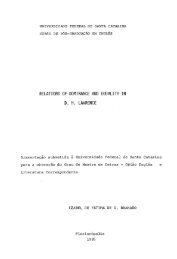Oliveira, Paula Felipe Schlemper de - UFSC
Oliveira, Paula Felipe Schlemper de - UFSC
Oliveira, Paula Felipe Schlemper de - UFSC
You also want an ePaper? Increase the reach of your titles
YUMPU automatically turns print PDFs into web optimized ePapers that Google loves.
73<br />
[…] the i<strong>de</strong>a of multiple literacies […] was an<br />
important construct in challenging that<br />
autonomous singular literacy. […] However,<br />
what I begin to see happening now makes me<br />
feel that there is a danger of reification again. In<br />
characterizing literacy as multiple, it is very easy<br />
to slip into then assuming that there is a single<br />
literacy associated with a single culture, so that<br />
there are multiple literacies just as there are,<br />
supposedly, multiple cultures 58 .<br />
Para o autor, não se po<strong>de</strong> simplesmente estabelecer relações<br />
isomórficas entre um letramento e uma cultura, porque, em sua<br />
compreensão, cultura não po<strong>de</strong> ser tomada como um inventário <strong>de</strong><br />
características; ao contrário, tem natureza múltipla, contestada e<br />
processual. Escreve o autor: “So in that sense, one cannot simply line up<br />
a single ‘literacy’ with a single ‘culture’ 59 ” (STREET, 2000, p, 19). Do<br />
mesmo modo, o autor atenta para implicações do conceito <strong>de</strong><br />
multiletramentos. Ele pontua que a noção <strong>de</strong> multiletramento foi<br />
apresentada para se referir não a letramentos múltiplos, associados a<br />
culturas diferentes, mas as múltiplas formas <strong>de</strong> letramento associadas a<br />
diferentes usos da escrita nas diferentes socieda<strong>de</strong>s e <strong>de</strong>ntro <strong>de</strong> uma<br />
mesma socieda<strong>de</strong>. O autor chama atenção, ainda, para uma versão<br />
extrema <strong>de</strong>sses posicionamentos, que coloca em projeção outras<br />
semioses:<br />
The extreme version of this position is the notion<br />
of ‘the end of language’ – that somehow we are<br />
no longer talking about language in its rather<br />
traditional notion of grammar, lexicon and<br />
semantics, but rather we are now talking about<br />
semiotic systems that cut across reading, writing,<br />
speech, into all these other semiotic forms of<br />
communication. This, then, is what is signaled by<br />
the term ‘multi-literacies’: a rather different<br />
approach from that entailed by the ‘multiple<br />
58 [...] a i<strong>de</strong>ia <strong>de</strong> letramentos múltiplos foi um elemento importante no embate suscitado ante ao<br />
letramento singular autônomo. [...] No entanto, o que eu começo a ver acontecer agora me faz<br />
sentir que existe o perigo <strong>de</strong> reificação novamente. Ao caracterizar letramento como múltiplo,<br />
é muito fácil <strong>de</strong>slizar em seguida assumindo a existência <strong>de</strong> um letramento único associado<br />
com uma única cultura, do mesmo modo que existem letramentos múltiplos, assim como há,<br />
supostamente, múltiplas culturas.<br />
59 Então, nesse sentido, não se po<strong>de</strong> simplesmente alinhar um ‘letramento’ único com uma<br />
‘cultura’ única.

















